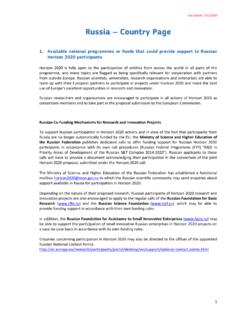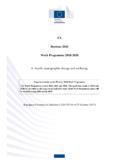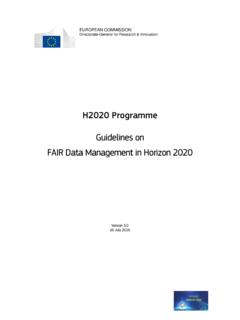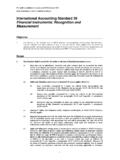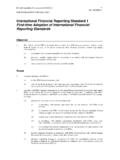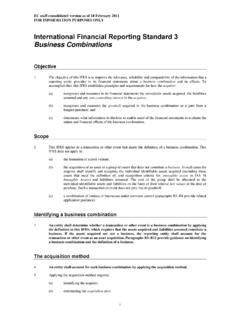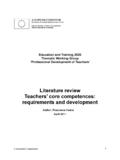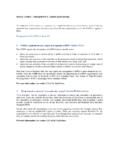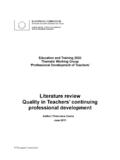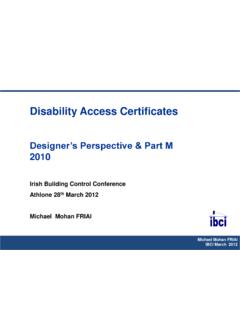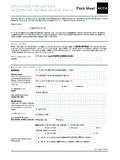Transcription of COMMISSION REGULATION (EU) No …/.. of XXX
1 EUROPEAN. COMMISSION . Brussels, XXX. C(2014) 3292/3. COMMISSION REGULATION (EU) No /.. of XXX. declaring certain categories of aid compatible with the internal market in application of Articles 107 and 108 of the Treaty (Text with EEA relevance). EN EN. TABLE OF CONTENTS. CHAPTER I Common 22. CHAPTER II 52. CHAPTER III Specific provisions for different categories of aid .. 53. Section 1 - Regional aid .. 53. Section 2 Aid to SMEs .. 60. Section 3 - Aid for access to finance for SMEs .. 62. Section 4 Aid for research and development and 67. Section 5- Training 72. Section 6 - Aid for disadvantaged workers and for workers with disabilities .. 72. Section 7 Aid for environmental 75. Section 8 Aid to make good the damage caused by certain natural disasters .. 86. Section 9 - Social aid for transport for residents of remote 87. Section 10 - Aid for broadband 88. Section 11 - Aid for culture and heritage 89.
2 Section 12 - Aid for sport and multifunctional recreational infrastructures .. 92. Section 13 - Aid for local infrastructures .. 93. CHAPTER IV Final Provisions .. 94. EN 2 EN. COMMISSION REGULATION (EU) No /.. of XXX. declaring certain categories of aid compatible with the internal market in application of Articles 107 and 108 of the Treaty (Text with EEA relevance). THE EUROPEAN COMMISSION , Having regard to the Treaty on the Functioning of the European Union, and in particular Article 108(4) thereof, Having regard to Council REGULATION (EC) No 994/98 of 7 May 1998 on the application of Articles 92 and 93 of the Treaty establishing the European Community to certain categories of horizontal State aid1, and in particular Article 1(1) (a) and (b) thereof, [Having published a draft of this REGULATION [OJ reference],]. [After consulting the Advisory Committee on State Aid,]. Whereas: (1) State funding meeting the criteria in Article 107(1) of the Treaty constitutes State aid and requires notification to the COMMISSION by virtue of Article 108(3) of the Treaty.
3 However, according to Article 109 of the Treaty, the Council may determine categories of aid that are exempted from this notification requirement. In accordance with Article 108(4) of the Treaty the COMMISSION may adopt regulations relating to those categories of State aid. Council REGULATION (EC) No 994/98 empowers the COMMISSION to declare, in accordance with Article 109 of the Treaty, that the following categories may, under certain conditions, be exempted from the notification requirement: aid to small and medium-sized enterprises ( SMEs'), aid in favour of research and development, aid in favour of environmental protection, employment and training aid and aid that complies with the map approved by the COMMISSION for each Member State for the grant of regional aid. On that basis, the COMMISSION adopted COMMISSION REGULATION (EC) No 800/2008 of 6 August 2008 declaring certain categories of aid compatible with the common market in application of Articles 87 and 88 of the Treaty.
4 REGULATION (EC) No 800/2008 originally applied until 31 December 2013 but was subsequently prolonged by COMMISSION REGULATION (EU) No 1224/2013. of 29 November 2013 amending REGULATION (EC) No 800/2008 as regards its period of application 2 and now expires on 30 June 2014. On 22 July 2013 REGULATION (EC) No 994/98 was amended by Council REGULATION (EU) No 733/2013 to empower the COMMISSION to extend the block exemption to new categories of aid, in respect of 1. OJ L 142, , p. 1. 2. OJ L 320, , p. 22. EN 3 EN. which clear compatibility conditions can be defined. Such new categories of block exempted aid include: aid to make good the damage caused by certain natural disasters, social aid for transport for residents of remote regions, aid for broadband infrastructures, aid for innovation, aid for culture and heritage conservation, aid for sport and multifunctional recreational infrastructures.
5 Provided that sufficient case experience is further developed allowing the design of operational exemption criteria ensuring the ex-ante compatibility of other categories of aid, the COMMISSION intends to review the scope of this REGULATION with a view to including certain types of aid in those areas. In particular, the COMMISSION envisages developing criteria for port and airport infrastructure by December 2015. (2) With its Communication on EU State Aid Modernisation (SAM)3, the COMMISSION launched a wider review of the State aid rules. The main objectives of this modernisation are (i) to achieve sustainable, smart and inclusive growth in a competitive internal market, while contributing to Member State efforts towards a more efficient use of public finances, (ii) to focus COMMISSION ex ante scrutiny of aid measures on cases with the biggest impact on the internal market, while strengthening Member State cooperation in State aid enforcement, and (iii) to streamline the rules and provide for faster, better informed and more robust decisions based on a clear economic rationale, a common approach and clear obligations.
6 The review of REGULATION (EC) No 800/2008 constitutes a central element of SAM. (3) This REGULATION should allow for better prioritisation of State aid enforcement activities, greater simplification and should enhance transparency, effective evaluation and the control of compliance with the State aid rules at national and Union levels, while preserving the institutional competences of the COMMISSION and the Member States. In accordance with the principle of proportionality this REGULATION does not go beyond what is necessary in order to achieve those objectives. (4) The COMMISSION 's experience in applying REGULATION (EC) No 800/2008 has allowed it to better define the conditions under which certain categories of aid can be considered compatible with the internal market and to extend the scope of block exemptions. It also revealed the necessity to strengthen transparency, monitoring and proper evaluation of very large schemes in light of their effect on competition in the internal market.
7 (5) The general conditions for the application of this REGULATION should be defined on the basis of a set of common principles that ensure the aid serves a purpose of common interest, has a clear incentive effect, is appropriate and proportionate, is granted in full transparency and subject to a control mechanism and regular evaluation, and does not adversely affect trading conditions to an extent that is contrary to the common interest. (6) Aid that fulfils all the conditions laid down in this REGULATION both general and specific to the relevant categories of aid should be exempted from the notification obligation laid down in Article 108(3) of the Treaty. (7) State aid within the meaning of Article 107(1) of the Treaty not covered by this REGULATION remains subject to the notification requirement of Article 108(3) of the Treaty. This REGULATION is without prejudice to the possibility for Member States to notify aid the objectives of which correspond to objectives covered by this REGULATION .
8 3. COM (2012) 209, EN 4 EN. (8) In view of the greater potential impact of large schemes on trade and competition, aid schemes with an average annual State aid budget exceeding a threshold based on an absolute value should in principle be subject to State aid evaluation. The evaluation should aim at verifying whether the assumptions and conditions underlying the compatibility of the scheme have been achieved, as well as the effectiveness of the aid measure in the light of its general and specific objectives and should provide indications on the impact of the scheme on competition and trade. In order to ensure equal treatment, State aid evaluation should be carried out on the basis of an evaluation plan approved by the COMMISSION . While such plan should normally be drawn up at the moment of the design of the scheme and approved in time for the scheme to enter into force, this may not be possible in all cases.
9 Therefore, in order not to delay their entry into force, this REGULATION will apply to such schemes for a maximum period of six months. The COMMISSION may decide to extend this period, upon approval of the evaluation plan. To this end, the evaluation plan should be notified to the COMMISSION within 20 working days following the entry into force of the scheme. The COMMISSION can also exceptionally decide that an evaluation is not necessary given the specificities of the The COMMISSION should receive from the Member State the necessary information to be able to carry out the assessment of the evaluation plan and request additional information without undue delay allowing the Member State to complete the missing elements for the COMMISSION to take a decision. In view of the novelty of this process, the COMMISSION will provide, in a separate document, a detailed guidance on the procedure applicable during the 6.
10 Months period for the approval of the evaluation plan and the relevant templates through which the evaluation plans will have to be submitted. Alterations of schemes subject to evaluation, other than modifications which cannot affect the compatibility of the aid scheme under this REGULATION or cannot significantly affect the content of the approved evaluation plan, should be assessed taking account of the outcome of such evaluation and should be excluded from the scope of this REGULATION . The alterations such as purely formal modifications, administrative modifications or alterations carried out within the framework of the EU co-financed measures should not, in principle, be considered as significantly affecting the content of the approved evaluation plan. (9) This REGULATION should not apply to aid contingent upon the use of domestic over imported products or aid to export-related activities.
